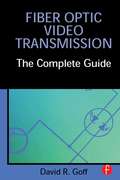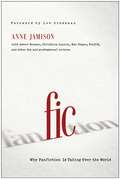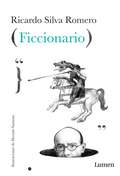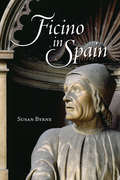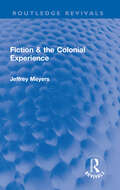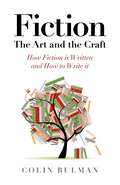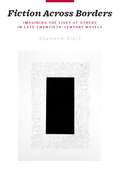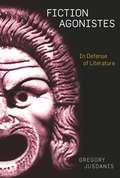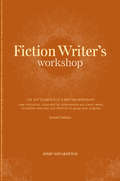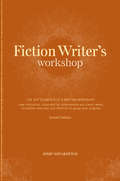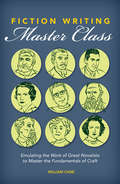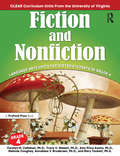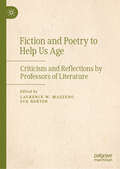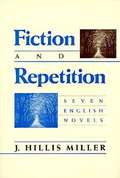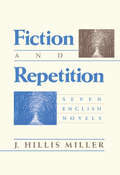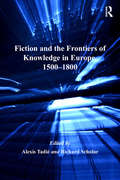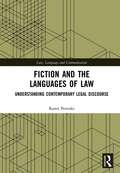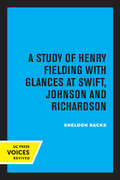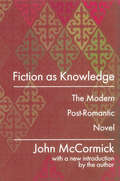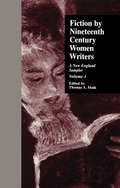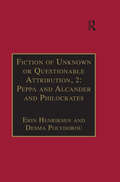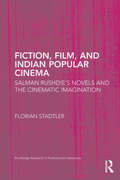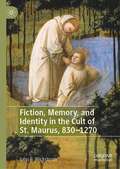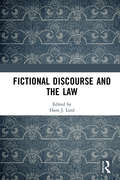- Table View
- List View
Fiber Optic Video Transmission: The Complete Guide
by David GoffFiber Optic Video Transmission: The Complete Guide is the only comprehensive reference to the techniques and hardware required to transmit video signals over optical fiber. As the broadcast industry moves to HDTV and enhanced television standards become the norm, fiber will become the medium of choice for video transmission, and this book is the essential guide to transmitting video over fiber optic cables. From the most basic video signal to complex multi-channel high definition video, this book details the methods of encoding video signals (including AM, FM, and digital encoding), the advantages and disadvantages of all encoding methods, and the expected performance of each method. A discussion of the the fiber optic components - such as lasers, LEDs, detectors, connectors, and other components - that are best for video transmission applications is also included. A glossary of terms, appendices of standards and publications, and a complete index round out this comprehensive guide.
Fic: Why Fanfiction Is Taking Over the World
by Anne JamisonWhat is fanfiction, and what is it not? Why does fanfiction matter? And what makes it so important to the future of literature? Fic is a groundbreaking exploration of the history and culture of fan writing and what it means for the way we think about reading, writing, and authorship. It's a story about literature, community, and technology—about what stories are being told, who's telling them, how, and why. With provocative discussions from both professional and fan writers, on subjects from Star Trek to The X-Files and Buffy the Vampire Slayer to Harry Potter, Twilight, and beyond, Fic sheds light on the widely misunderstood world(s) of fanfiction—not only how fanfiction is transforming the literary landscape, but how it already has. Fic features a foreword by Lev Grossman (author of The Magicians) and interviews with Jonathan Lethem, Doug Wright, Eurydice (Vivean Dean), and Katie Forsythe/wordstrings. Cyndy Aleo (algonquinrt; d0tpark3r) V. Arrow (aimmyarrowshigh) Tish Beaty (his_tweet) Brad Bell Amber Benson Peter Berg (Homfrog) Kristina Busse Rachel Caine Francesca Coppa Randi Flanagan (BellaFlan) Jolie Fontenot Wendy C. Fries (Atlin Merrick) Ron Hogan Bethan Jones Christina Lauren (Christina Hobbs/tby789 and Lauren Billings/LolaShoes) Jacqueline Lichtenberg Rukmini Pande and Samira Nadkarni Chris Rankin Tiffany Reisz Andrew Shaffer Andy Sawyer Heidi Tandy (Heidi8) Darren Wershler Jules Wilkinson (missyjack) Jen Zern (NautiBitz)
Ficcionario
by Ricardo Silva RomeroTreinta y cinco definiciones sobre la ficción y el drama de uno de los autores colombianos más importantes de la actualidad. "Puede ser que las cosas pasen porque sí, pero yo me he jugado la vida por el drama. He creído, porque en algo hay que creer, que todo sucede por algo y para algo. Y que cada historia del mundo puede ser contada en tres actos". Ricardo Silva Romero Lo primero que el lector debe saber sobre este Ficcionario es que no es, precisamente, un libro de ensayos sobre literatura. Sí es, en cambio, una colección de respuestas a treinta y cinco sospechas que Ricardo Silva Romero ha venido despejando a lo largo de su vida como escritor, sobre las formas en las que el drama -o la ilusión de que todo tiene sentido- está presente en la vida y en las distintas manifestaciones del arte. A modo de bestiario de la ficción, y con ilustraciones de Hernán Sansone para abrir cada capítulo, aquí el autor realiza un inventario de sus pasiones -el cine de Alfred Hitchcock, de Martin Scorsese, de Woody Allen, de Mike Nichols; la literatura de Alejandro Dumas, de Paul Auster, de los hermanos Grimm; la poesía de César Vallejo; la música de Paul Simon, entre muchas otras-, que ejemplifican de manera brillante una amplia gama de temas relacionados con las decisiones que hay detrás de cada historia y de cada personaje. Escrito con un profundo respeto por el oficio, Ficcionario es un libro esencial para lectores, espectadores, directores, escritores o cualquier persona interesada en descifrar el arte de contar historias.
Ficino in Spain
by Susan ByrneAs the first translator of Plato's complete works into Latin, the Florentine writer Marsilio Ficino (1433-99) and his blend of Neoplatonic and Hermetic philosophy were fundamental to the intellectual atmosphere of the Renaissance. In Spain, his works were regularly read, quoted, and referenced, at least until the nineteenth century, when literary critics and philosophers wrote him out of the history of early modern Spain.In Ficino in Spain, Susan Byrne uses textual and bibliographic evidence to show the pervasive impact of Ficino's writings and translations on the Spanish Renaissance. Cataloguing everything from specific mentions of his name in major texts to glossed volumes of his works in Spanish libraries, Byrne shows that Spanish writers such as Miguel de Cervantes, Lope de Vega, Bartolomé de las Casas, and Garcilaso de la Vega all responded to Ficino and adapted his imagery for their own works. An important contribution to the study of Spanish literature and culture from the fifteenth to the seventeenth centuries, Ficino in Spain recovers the role that Hermetic and Neoplatonic thought played in the world of Spanish literature.
Fiction & the Colonial Experience (Routledge Revivals)
by Jeffrey MeyersBritish colonialism provided a rich vein of material for the novelists of the first half of the 20th century. This study, originally published in 1968, looks at five writers and their reaction to the Empire: Rudyard Kipling, E. M. Forster, Joseph Conrad, Joyce Cary and Graham Greene. It shows how the romantic adventure stories of Kipling’s early days, in which the indigenous population plays almost no part, gave rise to the much more important novels of spiritual and moral conflict in which the stereotyped values of Empire are questioned. The decline of colonialism from its apogee in the 1880s within a relatively short period makes the novels discussed a compact group, so that not only is the use of colonial material closely studied, but its impact on the novelists themselves emerges clearly. This is an important study of a major literary theme, linking modern literature and modern history at a vital point.
Fiction - The Art and the Craft: How Fiction is Written and How to Write it
by Colin BulmanFiction - The Art and the Craft is a highly practical exposition of all the major elements of fiction - such as plot, conflict, suspense, the hook, inference, character and dialogue - and how these elements are combined to make a compelling story. Using examples from well-known works of literature and incorporating exercises, research suggestions and activities, this informative, interesting and accessible book is a must-read for any author.
Fiction Across Borders: Imagining the Lives of Others in Late-Twentieth-Century Novels
by Shameem BlackTheorists of Orientalism and postcolonialism argue that novelists betray political and cultural anxieties when characterizing "the Other." Shameem Black takes a different stance. Turning a fresh eye toward several key contemporary novelists, she reveals how "border-crossing" fiction represents socially diverse groups without resorting to stereotype, idealization, or other forms of imaginative constraint. Focusing on the work of J. M. Coetzee, Amitav Ghosh, Jeffrey Eugenides, Ruth Ozeki, Charles Johnson, Gish Jen, and Rupa Bajwa, Black introduces an interpretative lens that captures the ways in which these authors envision an ethics of representing social difference. They not only offer sympathetic portrayals of the lives of others but also detail the processes of imagining social difference. Whether depicting the multilingual worlds of South and Southeast Asia, the exportation of American culture abroad, or the racial tension of postapartheid South Africa, these transcultural representations explore social and political hierarchies in constructive ways. Boldly confronting the orthodoxies of recent literary criticism, Fiction Across Borders builds upon such seminal works as Edward Said's Orientalism and offers a provocative new study of the late twentieth-century novel.
Fiction Across Borders: Imagining the Lives of Others in Late-Twentieth-Century Novels
by Shameem BlackTheorists of Orientalism and postcolonialism argue that novelists betray political and cultural anxieties when characterizing "the Other." Shameem Black takes a different stance. Turning a fresh eye toward several key contemporary novelists, she reveals how "border-crossing" fiction represents socially diverse groups without resorting to stereotype, idealization, or other forms of imaginative constraint. Focusing on the work of J. M. Coetzee, Amitav Ghosh, Jeffrey Eugenides, Ruth Ozeki, Charles Johnson, Gish Jen, and Rupa Bajwa, Black introduces an interpretative lens that captures the ways in which these authors envision an ethics of representing social difference. They not only offer sympathetic portrayals of the lives of others but also detail the processes of imagining social difference. Whether depicting the multilingual worlds of South and Southeast Asia, the exportation of American culture abroad, or the racial tension of postapartheid South Africa, these transcultural representations explore social and political hierarchies in constructive ways. Boldly confronting the orthodoxies of recent literary criticism, Fiction Across Borders builds upon such seminal works as Edward Said's Orientalism and offers a provocative new study of the late twentieth-century novel.
Fiction Agonistes: In Defense of Literature
by Gregory JusdanisJusdanis, who is not further identified, defends literature as a form of art, and art as a purveyor of beauty, and beauty as one of the necessary conditions for being human, one that has been neglected at best but too often heaped with facile praise or denigration in the jaded spheres of academe. He considers overture and themes, art's apology, two autonomies, art as parabasis, the line between living and pretending, and the future of a fiction. Annotation ©2010 Book News, Inc. , Portland, OR (booknews. com)
Fiction Writer's Wokrshop
by Josip NovakovichMaster the Elements of the Writing Workshop The great paradox of the writing life is that to be a good writer, you must be both interested in the world around you and comfortable working in solitude for hours on end. Fiction Writer's Workshop is designed to help you foster a strong sense of independence#150;of being and thinking on your own, of becoming self-evaluative without being self-critical#150;in order to accomplish what others seek in classroom groups. In this comprehensive guide, award-winning writer and teacher Josip Novakovich explores every aspect of the art of fiction and provides all the tools and techniques you'll need to develop day-to-day discipline as well as a personal writing style, such as: More than 100 writing exercises, including dozens that are new to this edition, that challenge you to experiment with diverse writing styles Specific statements of purpose for each exercise, to help guide you and instruct you at every step of the creative process Self-critique questions to help you assess your work and identify strengths and weaknesses before moving on to the next lesson The full text of eight acclaimed short stories, with analysis and exercises, to provide models for your own writing and help reinforce the lessons you've learned The practical, insightful methods offered in this workshop will clarify your voice, broaden your perspective, and strengthen your fiction.
Fiction Writer's Workshop: The Key Elements of a Writing Workshop
by Josip NovakovichMaster the Elements of the Writing Workshop The great paradox of the writing life is that to be a good writer, you must be both interested in the world around you and comfortable working in solitude for hours on end. Fiction Writer's Workshop, Second Edition, is designed to help you foster a strong sense of independence#151;of being and thinking on your own, of becoming self-evaluative without being self-critical#151;in order to accomplish what others seek in classroom groups. In this comprehensive guide, award-winning writer and teacher Josip Novakovich explores every aspect of the art of fiction and provides all the tools and techniques you'll need to develop day-to-day discipline as well as a personal writing style, such as: More than 100 writing exercises, including dozens that are new to this edition, that challenge you to experiment with diverse writing styles Specific statements of purpose for each exercise, to help guide you and instruct you at every step of the creative process Self-critique questions to help you assess your work and identify strengths and weaknesses before moving on to the next lesson The full text of eight acclaimed short stories, with analysis and exercises, to provide models for your own writing and help reinforce the lessons you've learned The practical, insightful methods offered in this workshop will clarify your voice, broaden your perspective, and strengthen your fiction.
Fiction Writing Master Class: Emulating the Work of Great Novelists to Master the Fundamentals of Craft
by William CaneWant to find your voice? Learn from the best! In your development as a writer, you've likely been told to develop your own unique writing style, as if it were as simple as pulling it out of thin air. But finding your voice isn't easy--it requires time, practice, and a thorough understanding of how great fiction is written. Fiction Writing Master Class analyzes the writing styles of twenty-one superior novelists including Charles Dickens, Edith Wharton, Franz Kafka, Flannery O'Connor, Ray Bradbury, and many others. This fascinating and insightful guide mines the writing secrets of these exceptional authors and shows you how to use them to develop a writing style that stands out in a crowd. You'll discover how to: Create characters as memorable as Herman Melville's Captain Ahab Master point of view with techniques from Fyodor Dostoevsky Pick up the pace by keeping your sentences lean like Ernest Hemingway Incorporate sensual details like James Bond creator Ian Fleming Add suspense to your story by following the lead of horror master Stephen King And that's not all, Fiction Writing Master Class is your key to understanding and implementing the proven techniques of history's greatest authors, taking your writing to a whole new level of excellence in the process.
Fiction and Nonfiction: Language Arts Units for Gifted Students in Grade 4
by Carolyn M. Callahan Tracy C. MissettThe CLEAR curriculum, developed by University of Virginia's National Research Center on the Gifted and Talented, is an evidence-based teaching model that emphasizes Challenge Leading to Engagement, Achievement, and Results. In Fiction and Nonfiction: Language Arts Units for Gifted Students in Grade 4, students will read and analyze short stories and write their own short story in the fiction unit. In the nonfiction unit, students will study nonfiction (and creative nonfiction) texts to examine how writers use many of the same devices to tell nonfiction stories. Students will read a variety of texts and will write their own memoirs. These units focus on critical literacy skills, including reading diverse content, understanding texts as reflections of culture, and finding bias in fiction and nonfiction.Grade 4
Fiction and Poetry to Help Us Age: Criticism and Reflections by Professors of Literature
by Laurence W. Mazzeno Sue NortonThis volume explores the theme of age and aging, uniquely combining personal reflections from literature professors with sound scholarly analysis of a range of fiction and poetry. Bringing together leading literary scholars, this collection of essays covers a range of writers and texts, representing both the canon and new voices. By combining the chapter authors' expertise as literary and cultural critics with their own responses to novels, short stories and poems, the book offers new insights into the life trajectories made available to fiction and poetry readers through compelling narrative and vivid literary representation.
Fiction and Repetition: Seven English Novels
by J. Hillis Miller<p>In Fiction and Repetition, one of our leading critics and literary theorists offers detailed interpretations of seven novels: Emily Brontë's Wuthering Heights, Thackeray's Henry Esmond, Hardy's Tess of the d'Urbervilles and The Well-Beloved, Conrad's Lord Jim, and Woolf's Mrs. Dalloway and Between the Acts. Miller explores the multifarious ways in which repetition generates meaning in these novels―repetition of images, metaphors, motifs; repetition on a larger scale of episodes, characters, plots; and repetition from one novel to another by the same or different authors. While repetition creates meanings, it also, Miller argues, prevents the identification of a single determinable meaning for any of the novels; rather, the patterns made by the various repetitive sequences offer alternative possibilities of meaning which are incompatible. He thus sees “undecidability” as an inherent feature of the novels discussed. <p>His conclusions make a provocative contribution to current debates about narrative theory and about the principles of literary criticism generally. His book is not a work of theory as such, however, and he avoids the technical terminology dear to many theorists; his book is an attempt to interpret as best he can his chosen texts. Because of his rare critical gifts and his sensitivity to literary values and nuances, his readings send one back to the novels with a new appreciation of their riches and their complexities of form.</p>
Fiction and Repetition: Seven English Novels
by J. Hillis MillerIn Fiction and Repetition, one of our leading critics and literary theorists offers detailed interpretations of seven novels: Emily Brontë's Wuthering Heights, Thackeray's Henry Esmond, Hardy's Tess of the d'Urbervilles and The Well-Beloved, Conrad's Lord Jim, and Woolf's Mrs. Dalloway and Between the Acts. Miller explores the multifarious ways in which repetition generates meaning in these novels—repetition of images, metaphors, motifs; repetition on a larger scale of episodes, characters, plots; and repetition from one novel to another by the same or different authors. While repetition creates meanings, it also, Miller argues, prevents the identification of a single determinable meaning for any of the novels; rather, the patterns made by the various repetitive sequences offer alternative possibilities of meaning which are incompatible. He thus sees “undecidability” as an inherent feature of the novels discussed. His conclusions make a provocative contribution to current debates about narrative theory and about the principles of literary criticism generally. His book is not a work of theory as such, however, and he avoids the technical terminology dear to many theorists; his book is an attempt to interpret as best he can his chosen texts. Because of his rare critical gifts and his sensitivity to literary values and nuances, his readings send one back to the novels with a new appreciation of their riches and their complexities of form.
Fiction and the Frontiers of Knowledge in Europe, 1500-1800
by Richard Scholar Alexis TadiéThe uses of fiction in early modern Europe are far more varied than is often assumed by those who consider fiction to be synonymous with the novel. The contributors to this volume demonstrate the significant role that fiction plays in early modern European culture, not only in a variety of its literary genres, but also in its formation of philosophical ideas, political theories, and the law. The volume explores these uses of fiction in a series of interrelated case studies, ranging from the Italian Renaissance to the French Revolution and examining the work of, among others, Montaigne, Corneille, Descartes, Hobbes, Locke, and Diderot. It asks: Where does fiction live, and thrive? Under what conditions, and to what ends? It suggests that fiction is best understood not as a genre or a discipline but, instead, as a frontier: one that demarcates literary genres and disciplines of knowledge and which, crucially, allows for the circulation of ideas between them.
Fiction and the Languages of Law: Understanding Contemporary Legal Discourse (Law, Language and Communication)
by Karen PetroskiContemporary legal reasoning has more in common with fictional discourse than we tend to realize. Through an examination of the U.S. Supreme Court’s written output during a recent landmark term, this book exposes many of the parallels between these two special kinds of language use. Focusing on linguistic and rhetorical patterns in the dozens of reasoned opinions issued by the Court between October 2014 and June 2015, the book takes nonlawyer readers on a lively tour of contemporary American legal reasoning and acquaints legal readers with some surprising features of their own thinking and writing habits. It analyzes cases addressing a huge variety of issues, ranging from the rights of drivers stopped by the police to the decision-making processes of the Environmental Protection Agency—as well as the term’s best-known case, which recognized a constitutional right to marriage for same-sex as well as different-sex couples. Fiction and the Languages of Law reframes a number of long-running legal debates, identifies other related paradoxes within legal discourse, and traces them all to common sources: judges’ and lawyers’ habit of alternating unselfconsciously between two different attitudes toward the language they use, and a set of professional biases that tends to prevent scrutiny of that habit.
Fiction and the Shape of Belief: A Study of Henry Fielding with Glances at Swift, Johnson and Richardson
by Sheldon SacksThis title is part of UC Press's Voices Revived program, which commemorates University of California Press’s mission to seek out and cultivate the brightest minds and give them voice, reach, and impact. Drawing on a backlist dating to 1893, Voices Revived makes high-quality, peer-reviewed scholarship accessible once again using print-on-demand technology. This title was originally published in 1967.
Fiction as Knowledge: Modern Post-romantic Novel
by John McCormickCritics of fiction have long been aware that the romantic movement in Europe and America gave a powerful impulse to the art of fiction. The exact nature of that impulse has resisted analysis like so much associated with romanticism. In Fiction as Knowledge John McCormick reaches for precision, proposing that much of the vitality of modern fiction derives from romantic conceptions of history which made available to fiction not merely historical subject matter, but new perceptions of reality, present and past, that pervade the work of many of the greatest writers of the post-romantic period.Beginning with Herder and Hegel, McCormick describes those qualities in historical thought that were revolutionary in the early nineteenth century and rich in meaning for the future. Most prominent of these was the emergence of the idea of individuality, not only in society but also in history. The author demonstrates the vitality of the romantic impulse in the work of seven major novelists of the twentieth century. Marcel Proust's apprehensions of nature in his great novel are seen as Wordsworthian, while as the novel unfolds, history in the form of event and system of organization comes to dominate and to offer a paradigm of the workings of the post-romantic historical imagination. William Faulkner and Andr Malraux are shown to confront history directly, although they do not write "historical" fiction. Herman Broch, Robert Musil, and Henri de Montherlant, uncomfortable with traditional romantic attitudes, still make fullest use of Romantic historical insight to extend the range of fiction as knowledge. Ernest Hemingway, by contrast, is seen as intuitive, a pure product of his novelist's intelligence as opposed to his latter-day romantic anti-intellectualism.Fiction as Knowledge supplies critical insight into the form of the novel as well as into the seven novelists under discussion. Not least, the book is a warning against contemporary anti-historical bias and an appeal to the cultivation of historical consciousness. John McCormick is Professor Emeritus of Comparative Literature at Rutgers University, and Honorary Fellow of English and Literature at the University of York. He is the author of George Santayana: A Biography, Catastrophe and Imagination, and The Middle Distance, by Transaction.
Fiction by Nineteenth-Century Women Writers: A New England Sampler (Gender and Genre in Literature #10)
by Thomas A. MaikIn an era following the Civil War which saw change and transformation everywhere, new magazines emerged to record and report the change. Responding to the call for material to fill their pages, writers in regions such as New England, the West, and the South answered, most often with short stories. In fact, short fiction became the literature of choice for an emerging mass audience. And increasingly the voices of women writers found resonance in the pages of Harper's New Monthly ,Putnam's, and Galaxy, to name a few of the newly established magazines. In New England, writers such as Sarah Orne Jewett, Mary Wilkins Freeman, Harriet Beecher Stowe, Louisa May Alcott, Harriet Prescott Spofford, Sarah Johnson Prichard, and Rose Terry Cooke found a voice within the pages of these magazines. Although read widely in the late nineteenth century, increasingly these women writers-with a few exceptions-began to be marginalized early-on in the twentieth century. Besides expanding the canon, this collection of selected short stories by these seven New England writers attempts to restore what has been for many of them in this century either a diminished or even a lost voice.
Fiction of Unknown or Questionable Attribution, 2: Printed Writings 1641–1700: Series II, Part Three, Volume 10 (The Early Modern Englishwoman: A Facsimile Library of Essential Works & Printed Writings, 1641-1700: Series II, Part Three #Vols. 9-10)
by Erin Henriksen Desma PolydorouThe second of two volumes of 'Fiction of unknown or questionable authorship, 1641-1700,' this volume presents in facsimile two seventeenth-century novels, Alcander and Philocrates: Or, The Pleasures and Disquietudes of Marriage. A Novel. Written by a Young Lady (1696) and Peppa, or The Reward of Constant Love a novel: done out of French: with several songs set to musick for two voices / by a young-gentlewoman (1689). The first of these is an original, unattributed work written in English; the second is a translation from the French for which there is some evidence of a female translator. An original introduction to the volume provides information about the content of each novel; what the authors have discovered about each work's publication and authorship; and the physical copies of the seventeenth century books from which the facsimiles are taken.
Fiction, Film, and Indian Popular Cinema: Salman Rushdie’s Novels and the Cinematic Imagination (Routledge Research in Postcolonial Literatures #48)
by Florian StadtlerThis book analyses the novels of Salman Rushdie and their stylistic conventions in the context of Indian popular cinema and its role in the elaboration of the author’s arguments about post-independence postcolonial India. Focusing on different genres of Indian popular cinema, such as the ‘Social’, ‘Mythological’ and ‘Historical’, Stadtler examines how Rushdie’s writing foregrounds the epic, the mythic, the tragic and the comic, linking them in storylines narrated in cinematic parameters. The book shows that Indian popular cinema’s syncretism becomes an aesthetic marker in Rushdie’s fiction that allows him to elaborate on the multiplicity of Indian identity, both on the subcontinent and abroad, and illustrates how Rushdie uses Indian popular cinema in his narratives to express an aesthetics of hybridity and a particular conceptualization of culture with which ‘India’ has become identified in a global context. Also highlighted are Rushdie’s uses of cinema to inflect his reading of India as a pluralist nation and of the hybrid space occupied by the Indian diaspora across the world. The book connects Rushdie’s storylines with modes of cinematic representation to explore questions about the role, place and space of the individual in relation to a fast-changing social, economic and political space in India and the wider world.
Fiction, Memory, and Identity in the Cult of St. Maurus, 830–1270
by John B. WickstromThis book explores one of the most significant medieval saints’ cults, that of St. Maurus, the first known disciple of Saint Benedict. Despite the centrality of this story to the myth of medieval Benedictine culture, no major scholarly work has been devoted to Maurus since the late nineteenth century. Drawing on memory studies, this book investigates the origins and history of the cult, from the ninth-century Life of St. Maurus by Odo, abbot of Glanfueil, to its appropriation and re-shaping by three powerful abbeys through to the thirteenth century—Fossés, Cluny, and Montecassino. It traces how these institutions deployed caches of mostly forged documents (many translated here for the first time) to adapt the cult to their aspirations and, moreover, considers how the cult adapted itself further, to face the challenges of the modern world.
Fictional Discourse and the Law
by Hans J. LindDrawing on insights from literary theory and analytical philosophy, this book analyzes the intersection of law and literature from the distinct and unique perspective of fictional discourse. Pursuing an empirical approach, and using examples that range from Victorian literature to the current judicial treatment of rap music, the volume challenges the prevailing fact–fiction dichotomy in legal theory and practice by providing a better understanding of the peculiarities of legal fictionality, while also contributing further material to fictional theory’s endeavor to find a transdisciplinary valid criterion for a definition of fictional discourse. Following the basic presumptions of the early law-as-literature movement, past approaches have mainly focused on textuality and narrativity as the common denominators of law and literature, and have largely ignored the topic of fictionality. This volume provides a much needed analysis of this gap. The book will be of interest to scholars of legal theory, jurisprudence and legal writing, along with literature scholars and students of literature and the humanities.
